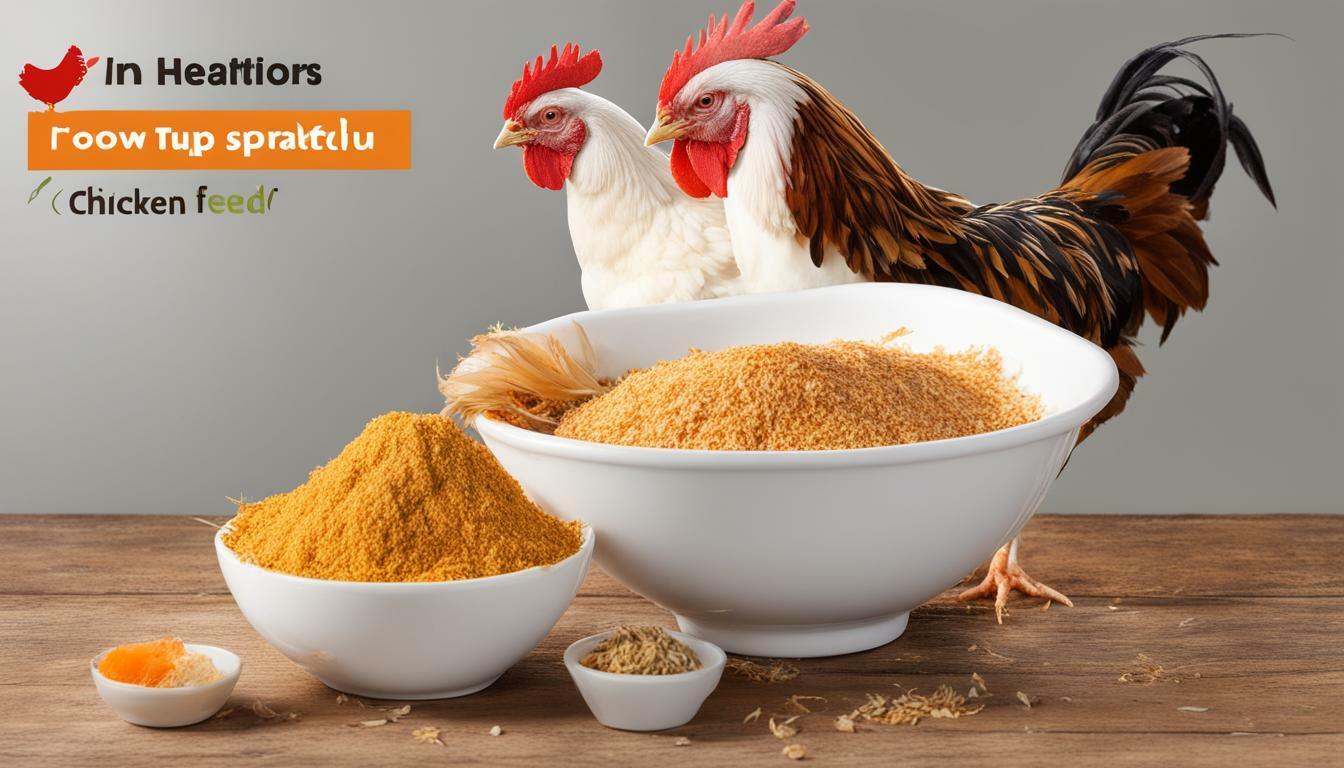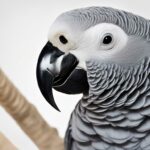As a chicken owner, it’s essential to understand the molting process and its impact on your flock’s nutritional needs. One common question that arises during molting is whether chickens eat less. In this section, we’ll explore the relationship between molting and chicken’s appetite and how to ensure your flock remains healthy during this critical period.
Key Takeaways:
- During molting, chickens experience a decrease in appetite.
- A balanced diet is crucial for healthy feather regrowth and overall chicken health.
- Feeding your chickens a protein-rich diet can help support feather regrowth.
The Molting Process in Chickens
Molting is a natural process in which chickens lose their old feathers and grow new ones. It typically occurs once a year, and can last from 2 to 4 months. During this period, chickens may experience a decrease in egg production, and their appetite may also be affected.
The molting process in chickens begins with the cessation of egg-laying. The bird’s body redirects energy from egg production to feather growth, causing old feathers to loosen and fall out. This process is hormonal and is triggered by a decrease in daylight hours.
The molting process occurs in three stages:
- Pre-molt: During this stage, the bird’s body starts to prepare for the molting process by absorbing nutrients to grow new feathers. This usually occurs two weeks prior to feather loss.
- Molt: This is the stage where the bird loses its old feathers and grows new ones. The process can take anywhere from 6 to 12 weeks to complete.
- Post-molt: After the molting process is complete, the bird will have grown a new set of feathers. During this stage, the bird may increase its appetite and begin laying eggs again.
Feather loss during the molting process is a normal occurrence, and should not raise any concerns. However, it is important to ensure that birds are not losing an excessive amount of feathers, as this may indicate underlying health issues.
To summarize, molting is a natural process in chickens where they lose old feathers and grow new ones. The process is hormonal and occurs in three stages. Feather loss is expected during the molting period, but excessive feather loss should be monitored.
Understanding the Impact on Appetite
During molting, chickens often experience a reduced appetite, leading to concerns about proper nutrition. But why do chickens eat less when molting? There are a few reasons for this decrease in food intake.
Firstly, molting requires a significant amount of energy from the chicken’s body. As a result, the bird’s metabolic rate slows down, and they need fewer nutrients to maintain their body weight. Secondly, feathers are primarily composed of protein, and molting chickens require a higher protein intake to regenerate their feathers. Without enough protein, feather regrowth can be stunted, causing them to become weak and brittle.
However, it is essential to make sure that molting chickens still receive adequate nutrition despite their decreased appetite. A diet that is too low in protein or other essential nutrients can impair the molting process and lead to long-term health problems.
To optimize nutrition during molting, it is recommended to provide a balanced diet that contains high-quality protein sources, fresh fruits, and vegetables. Consider adding supplements, such as amino acids and vitamin D, to support feather regrowth and overall health. Additionally, providing access to clean water and offering small meals throughout the day can encourage chickens to eat more and ensure they receive the necessary nutrients.
Optimizing Diet for Molting Chickens
Feeding your molting chickens a balanced diet is crucial for their overall health and successful feather regrowth. During this time, it’s important to provide your hens with the necessary nutrients to support their molting process.
Nutrition for Molting Chickens
A healthy diet for molting chickens should include adequate amounts of protein, vitamins, and minerals. Protein is essential for feather regrowth, and a lack of protein can lead to slow feather regrowth and poor feather quality. Vitamins like A, D, K, and B-complex are also important for healthy feather growth.
Minerals such as calcium, phosphorus, and copper are necessary for bone and feather development, and a deficiency in these minerals can lead to weak bones and feathers.
Feeding Molting Hens
During molting, it’s important to provide your hens with a high-quality feed that meets their nutritional requirements. A feed that contains high amounts of protein, vitamins, and minerals is ideal. You can also supplement their diet with additional sources of protein such as mealworms, boiled eggs, or cooked meat.
It’s also important to avoid feeding your molting chickens with scratch grains or treats that are low in nutrition. These types of feeds are often high in carbohydrates and can cause weight gain, which can further impact their molting process.
Healthy Diet for Molting Chickens
A healthy diet for molting chickens can include layer feed, which contains the necessary nutrients for molting hens. You can also feed them with a higher protein feed or create a custom diet that includes sources of protein, vitamins, and minerals.
Additionally, adding supplements like oyster shell or grit to their diet can provide calcium and other minerals that promote healthy feather and bone growth.
Overall, ensuring your molting chickens have a healthy and balanced diet full of essential nutrients will support their molt and improve their overall health.
Conclusion
In conclusion, the molting process can have a significant impact on a chicken’s appetite. While some chickens may eat less during this time, it’s essential to make sure they receive proper nutrition to support healthy feather regrowth. Feeding molting chickens a balanced diet that includes the right amount of protein, vitamins, and minerals can help ensure they have the nutrients they need to recover from molting. Make sure to include sources of protein like eggs or mealworms, as well as plenty of fruits and vegetables to ensure they receive adequate vitamins and minerals. So, to answer the question “Do chickens eat less when molting?” – the answer is often yes, but it’s crucial to make sure they receive a nutritious diet during this time. With the right care and feeding, your molting chickens will be on their way to healthy feather regrowth and continued good health.What is the Diet of Crows and Do They Eat Corn?
Crows’ corn diet is a subject of curiosity among many. While crows are known as opportunistic feeders, their diet is not limited to corn. These highly adaptable birds consume a wide variety of food, including insects, fruits, seeds, and even small animals. However, it is true that crows do have a fondness for corn and can often be seen foraging in fields, scavenging leftover kernels.
FAQ
Q: Do chickens eat less when molting?
A: Yes, chickens typically eat less when molting. The molting process requires a significant amount of energy, and chickens may have a reduced appetite during this time.
Q: Why do chickens molt?
A: Chickens molt as a natural part of their growth and development. Molting allows them to shed and replace old feathers, promoting healthy feather regrowth and maintaining their plumage.
Q: What are the stages of molting in chickens?
A: The molting process in chickens can be divided into three stages: pre-molt, molt, and post-molt. During the pre-molt stage, chickens may start losing feathers. The molt stage is characterized by the shedding of old feathers, while the post-molt stage involves the regrowth of new feathers.
Q: Why do molting chickens experience feather loss?
A: Molting chickens experience feather loss as part of the molting process. The shedding of old feathers allows new feathers to grow, ensuring that chickens maintain healthy plumage.
Q: How does reduced appetite during molting affect a chicken’s overall nutrition?
A: Reduced appetite during molting can impact a chicken’s overall nutrition. It’s important to ensure that molting chickens still receive a balanced diet to support their health and feather regrowth.
Q: What should I feed molting chickens?
A: When feeding molting chickens, it is recommended to provide a diet that is high in protein and rich in vitamins and minerals. Protein-rich foods such as mealworms, fish, and soybean meal can support feather regrowth, while a balanced poultry feed can provide essential nutrients.
Q: Are there any specific nutrients that molting chickens need?
A: Yes, there are specific nutrients that are important for molting chickens. These include protein, amino acids, vitamins (especially vitamin E), and minerals such as zinc and manganese. These nutrients support feather regrowth and overall health during molting.











